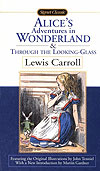
Alice's Adventures in Wonderland and Through the Looking Glass
By Lewis Carroll
Alice is the archetypal English heroine—she is full of common sense in a fantastic world of dangerous and mournful beasts, cross queens and duchesses, argumentative caterpillars, and philosophical eggs. There is a sense of anarchy in Alice that pleases all children—the adults are so clearly mad and muddled that the child, however baffled, feels wiser. Carroll never talks down to his readers, adult or child, and he doesn't try to improve or console them…just to amaze and delight. It's a strong book that makes its own world in its own terms. No one ever forgets its characters once she has met them.
By Lewis Carroll
Alice is the archetypal English heroine—she is full of common sense in a fantastic world of dangerous and mournful beasts, cross queens and duchesses, argumentative caterpillars, and philosophical eggs. There is a sense of anarchy in Alice that pleases all children—the adults are so clearly mad and muddled that the child, however baffled, feels wiser. Carroll never talks down to his readers, adult or child, and he doesn't try to improve or console them…just to amaze and delight. It's a strong book that makes its own world in its own terms. No one ever forgets its characters once she has met them.
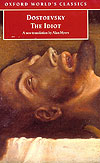
The Idiot
By Fyodor Dostoyevsky
I don't think this is Dostoyevsky's best book, but it is the one that most moves me. As a writer, I find its story powerful and seemingly inevitable, and yet we know (it was published in installments) that Dostoyevsky had no idea how it would end when he was halfway through. It moves me as a human being, because it deals with real terror—there is a description of a condemned man on his way to the scaffold, which is an account of Dostoyevsky's own feelings when he himself was taken to be executed. (He was reprieved at the last moment.) It is the best attempt I know at a novel about a character who tried to behave like Christ in the modern world. It is a powerful, unforgettable phantasmagoria.
By Fyodor Dostoyevsky
I don't think this is Dostoyevsky's best book, but it is the one that most moves me. As a writer, I find its story powerful and seemingly inevitable, and yet we know (it was published in installments) that Dostoyevsky had no idea how it would end when he was halfway through. It moves me as a human being, because it deals with real terror—there is a description of a condemned man on his way to the scaffold, which is an account of Dostoyevsky's own feelings when he himself was taken to be executed. (He was reprieved at the last moment.) It is the best attempt I know at a novel about a character who tried to behave like Christ in the modern world. It is a powerful, unforgettable phantasmagoria.
Poems by Alfred Lord Tennyson, Robert Browning, and Samuel Taylor Coleridge
Browning's The Pied Piper of Hamelin is full of rapid beats and ferocious actions—we used to chant it, tapping on the table. But I loved most the romantic mystery of Tennyson's Lady of Shalott, cursed to see the world only in a great mirror in her tower and weave a wonderful tapestry until—"half sick of shadows"—she looks out to see a knight passing. "Out flew the web and floated wide; / The mirror crack'd from side to side; / 'The curse is come upon me,' cried / The Lady of Shalott." Or the tale of Sir Bedivere in Morte d'Arthur, throwing the dying king's sword into the dark lake after the last battle. I saved up these images and rhythms for half a century—they crept into my ordinary prose if I didn't watch it—and then they broke out in Possession. Quite different was the driving ballad verse of Coleridge's The Rime of the Ancient Mariner, with its supernatural vision of seas burning and freezing, coiling sea snakes, and the crew of dead men taking the ship home. "And ice, mast-high, came floating by, / As green as emerald."
Browning's The Pied Piper of Hamelin is full of rapid beats and ferocious actions—we used to chant it, tapping on the table. But I loved most the romantic mystery of Tennyson's Lady of Shalott, cursed to see the world only in a great mirror in her tower and weave a wonderful tapestry until—"half sick of shadows"—she looks out to see a knight passing. "Out flew the web and floated wide; / The mirror crack'd from side to side; / 'The curse is come upon me,' cried / The Lady of Shalott." Or the tale of Sir Bedivere in Morte d'Arthur, throwing the dying king's sword into the dark lake after the last battle. I saved up these images and rhythms for half a century—they crept into my ordinary prose if I didn't watch it—and then they broke out in Possession. Quite different was the driving ballad verse of Coleridge's The Rime of the Ancient Mariner, with its supernatural vision of seas burning and freezing, coiling sea snakes, and the crew of dead men taking the ship home. "And ice, mast-high, came floating by, / As green as emerald."
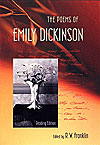
The Poems of Emily Dickinson
Edited by R.W. Franklin
No one could have imagined Emily Dickinson if she had not existed—a very great poet, rarely published in her lifetime, a quiet spinster quietly constructing a large body of completely original work using the rhythms of 19th-century hymns. She faced death and loss steadily: "Parting is all we know of heaven, / And all we need of hell." She made us see spiders and birds as we never would have. She considered the nature of eternity. She was uncompromising. It is because of her, I believe, that America has so many good women poets. She freed their voices. When I was writing Possession I read and reread her. She was tough and true and entirely herself. You can't imitate her, but you can learn from her.
Edited by R.W. Franklin
No one could have imagined Emily Dickinson if she had not existed—a very great poet, rarely published in her lifetime, a quiet spinster quietly constructing a large body of completely original work using the rhythms of 19th-century hymns. She faced death and loss steadily: "Parting is all we know of heaven, / And all we need of hell." She made us see spiders and birds as we never would have. She considered the nature of eternity. She was uncompromising. It is because of her, I believe, that America has so many good women poets. She freed their voices. When I was writing Possession I read and reread her. She was tough and true and entirely herself. You can't imitate her, but you can learn from her.
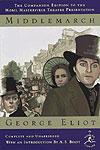
Middlemarch
By George Eliot
Virginia Woolf said that Middlemarch was one of the few English novels written for grown-ups. It is a hugely ambitious, hugely successful, wise, and satisfying work. I never reread it without discovering something I hadn't noticed before. It is funny as well as tragic, sensible as well as profound. I myself am more moved by the tale of Lydgate—the doctor who fails because he doesn't think hard enough about the woman he marries—than by the tale of the ardent Dorothea, who, out of willful idealism, marries a dried-up scholar. But the two are inextricably part of the same whole. Eliot said she wanted to show "the gradual action of ordinary causes," and she does it triumphantly.
By George Eliot
Virginia Woolf said that Middlemarch was one of the few English novels written for grown-ups. It is a hugely ambitious, hugely successful, wise, and satisfying work. I never reread it without discovering something I hadn't noticed before. It is funny as well as tragic, sensible as well as profound. I myself am more moved by the tale of Lydgate—the doctor who fails because he doesn't think hard enough about the woman he marries—than by the tale of the ardent Dorothea, who, out of willful idealism, marries a dried-up scholar. But the two are inextricably part of the same whole. Eliot said she wanted to show "the gradual action of ordinary causes," and she does it triumphantly.
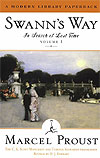
In Search of Lost Time
By Marcel Proust
I hesitated before including Proust. His great serial novel is so very long, and parts of it are hard to get through if you are not addicted. But the beginning and the end are wonderful, and it is—in my view—the greatest single work of fiction ever written. No one has made a more complete fictional world, teeming with everything human—thought and feeling, sex and snobbery, comedy and disaster, psychological finesse and huge comic set-piece scenes. He is the great analyst of love and jealousy; he understands cruelty and family feeling. And his lovely, long sentences are a sinuous delight.
By Marcel Proust
I hesitated before including Proust. His great serial novel is so very long, and parts of it are hard to get through if you are not addicted. But the beginning and the end are wonderful, and it is—in my view—the greatest single work of fiction ever written. No one has made a more complete fictional world, teeming with everything human—thought and feeling, sex and snobbery, comedy and disaster, psychological finesse and huge comic set-piece scenes. He is the great analyst of love and jealousy; he understands cruelty and family feeling. And his lovely, long sentences are a sinuous delight.
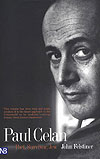
Paul Celan: Poet, Survivor, Jew
By John Felstiner
Celan was a Romanian Jew who wrote in German and drowned himself in Paris in 1970. His parents died in the camps in World War II. His poem, "Deathfugue," with its black, insistent rhythms and wicked imagery, is justly famous as the voice of the victims. He has that quality of greatness that changes your sense of what language can do—in his case, in circumstances of appalling difficulty. John Felstiner's excellent biography is full (as good biographies of poets should be but so often aren't) of the poems themselves, both in German and in Felstiner's own excellent English translations. They are not easy poems, but Felstiner makes us see how they work and how they came to be.
By John Felstiner
Celan was a Romanian Jew who wrote in German and drowned himself in Paris in 1970. His parents died in the camps in World War II. His poem, "Deathfugue," with its black, insistent rhythms and wicked imagery, is justly famous as the voice of the victims. He has that quality of greatness that changes your sense of what language can do—in his case, in circumstances of appalling difficulty. John Felstiner's excellent biography is full (as good biographies of poets should be but so often aren't) of the poems themselves, both in German and in Felstiner's own excellent English translations. They are not easy poems, but Felstiner makes us see how they work and how they came to be.




